
Europe's Lost Frontiers, volume 1: Context and Methodology PDF
272 Pages·2022·35.148 MB·English
Most books are stored in the elastic cloud where traffic is expensive. For this reason, we have a limit on daily download.
Preview Europe's Lost Frontiers, volume 1: Context and Methodology
Description:
Europe's Lost Frontiers was the largest directed archaeological research project undertaken in Europe to investigate the inundated landscapes of the Early Holocene North Sea - the area frequently referred to as 'Doggerland'. Funded through a European Research Council Advanced Grant (project number 670518), the project ran from 2015 to 2021, and involved more than 30 academics, representing institutions spread geographically from Ireland to China. A vast area of the seabed was mapped, and multiple ship expeditions were launched to retrieve sediment cores from the valleys of the lost prehistoric landscapes of the North Sea. This data has now been analysed to provide evidence of how the land was transformed in the face of climate change and rising sea levels. This volume is the first in a series of monographs dedicated to the analysis and interpretation of data generated by the project. As a precursor to the publication of the detailed results, it provides the context of the study and method statements. Later volumes will present the mapping, palaeoenvironment, geomorphology and modelling programmes of Europe's Lost Frontiers. The results of the project confirm that these landscapes, long held to be inaccessible to archaeology, can be studied directly and provide an archaeological narrative. This data will become increasingly important at a time when contemporary climate change and geo-political crises are pushing development within the North Sea at an unprecedented rate, and when the opportunities to explore this unique, heritage landscape may be significantly limited in the future.
See more
The list of books you might like
Most books are stored in the elastic cloud where traffic is expensive. For this reason, we have a limit on daily download.
